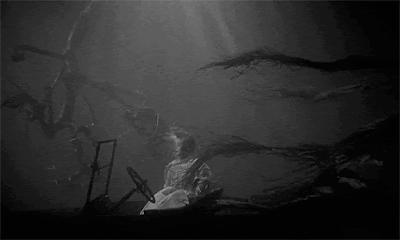Ah, little lad, you're staring at my fingers. Would you like me to tell you the little story of right-hand/left-hand? The story of good and evil? H-A-T-E! It was with this left hand that old brother Cain struck the blow that laid his brother low. L-O-V-E! You see these fingers, dear hearts? These fingers has veins that run straight to the soul of man. The right hand, friends, the hand of love. Now watch, and I'll show you the story of life. Those fingers, dear hearts, is always a-warring and a-tugging, one agin t'other. Now watch 'em! Old brother left hand, left hand he's a fighting, and it looks like love's a goner. But wait a minute! Hot dog, love's a winning! Yessirree! It's love that's won, and old left hand hate is down for the count!
The above quote is a distillation of the conflicts in The Night of the Hunter—a failure at the time of the film's release in 1955, but has become a cult classic among fans of the Gothic, the film-noir, the atmospheric, the poetic, and amongst film-makers—Spike Lee famously recalled it in Do the Right Thing—as what one is capable of when "making pictures". The movie veers from day-blasted scenes in the sunlight, to an artificially encroaching studio-night of terrors and claustrophobic angles.
One of the most stylized, creepiest movies ever made--the only one ever directed by actor Charles Laughton--The Night of the Hunter tells the story of an almost-elementally corrupt minister who comes to town seeking fortune by seducing and murdering the wife and terrifying the children of his old cell-mate, and tells it in the manner of a magical fairy tale. As two of the targets of the Rev.'s obsessions are the impressionable children of Willa Harper (Shelley Winters), the film becomes a battle between Good and Evil as seen through their eyes.The Good is represented by the Grandmother, played forthrightly by silent film star Lillian Gish. The Evil is the right Rev. Harry Powell, who strides into town with the conflicts in his soul tattooed on his fists. It's a bravura performance by Robert Mitchum, who wasn't known for bravura performances, usually satisfied maintaining a laconic air to get by. Here he brays and exhorts like a bull and it's an amazing thing to see so theatrical a performance come out of him--in fact, it's the role he's best remembered for. The film itself is a creepy blend of reality and fantasy, of realism and theatricality and the clashes of those sensibilities jar one's attention, while burrowing into the soft places of one's skull. Despite poor box-office and critical pans when it opened in 1955, The Night of the Hunter abides.











No comments:
Post a Comment